Knowledge Exchange at Eye Level
Our approach to training and supervising local experts
In professional exchange with colleagues in Kurdistan-Iraq and in the international debate on psychological and psychosocial support for survivors of violence, HAUKARI e.V. is committed to strengthening locally contextualised concepts and practices, to decolonising the transfer of knowledge between West/East and North/South and to creating spaces and platforms for an international exchange of knowledge between different contexts on an equal footing.
Table of Contents
Background
With the rise of the ‘Islamic State’ terrorist militia in Iraq and Syria in 2014 and the trail of death, suffering and destruction it left behind, Iraq once again became the focus of international aid. In addition to caring for internally displaced persons in Iraq, one focus is on providing psychosocial support to survivors of terror and violence and refugees. With the aim of ‘strengthening resilience’, international donors and the German Federal Ministry for Economic Cooperation and Development are investing in the so-called MHPSS sector – mental health and psychosocial support – i.e. in the expansion of psychosocial and trauma projects and in the training of psychological and psychosocial specialists in state institutions and civil society organisations. The Deutsche Gesellschaft für Internationale Zusammenarbeit (GIZ) has set up a special ‘Regional Programme for Psychosocial Support for Syrian and Iraqi Refugees’.
With our many years of expertise in supporting survivors of political and social violence, HAUKARI e.V. and our local partners are also part of psychosocial support networks and have, for example, worked on guidelines for psychosocial work and training manuals for local professionals as part of the above-mentioned GIZ regional programme (link: giz2018-en-orientierungs-rahmen-MHPSS.pdf) and organised regional conferences and exchanges.
At the same time, we have also taken a critical look at the focus of psychosocial work in the context of international aid and development cooperation. Looking at crisis regions through the MHPSS lens diagnoses entire population groups as traumatised per se and therefore in need of therapy, individualises and pathologises the suffering caused by war, displacement and violence and obscures the economic and political causes of war and conflict. The goal of ‘strengthening resilience’ is clearly driven by European security interests – and also those of regional states – in containing refugee movements. In the absence of political solutions to global conflicts, the aim is to strengthen resilience and provide psychosocial support to those affected by violence – as colleagues from medico international have put it – ‘to make them fit to persevere in a state of emergency’.
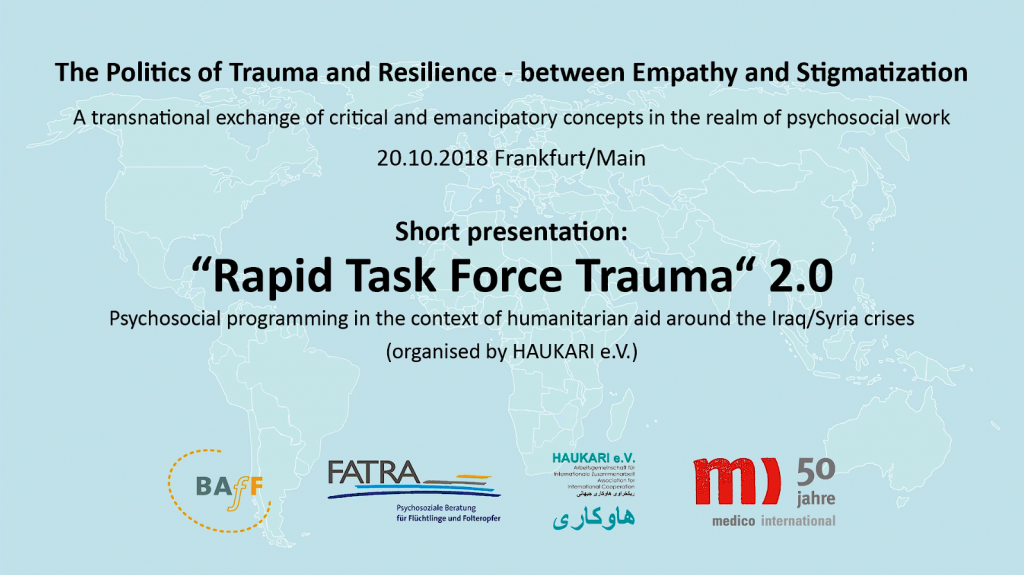
In October 2018, a conference organised by HAUKARI e.V., medico international, the Federal Association of Psychosocial Centres for Refugees and Torture Victims (BAfF) and the Frankfurt Working Group on Trauma and Exile (FATRA e.V. ), psychosocial practitioners from the Middle East, Africa and Latin America spoke about their dilemma of having access to funding for psychosocial counselling in the face of acute refugee and violent situations, but not being able to meet the basic needs of those affected, such as food, water, etc. at the conference on ‘Trauma and Resilience Policies’. The conference also revealed our own balancing act in this context: on the one hand, to see and criticise the domination and control function of psychosocial interventions in war and conflict regions; and at the same time, to be part of international aid policy and to use spaces under the umbrella of MHPSS activities in which emancipatory practice and empowerment projects are possible.
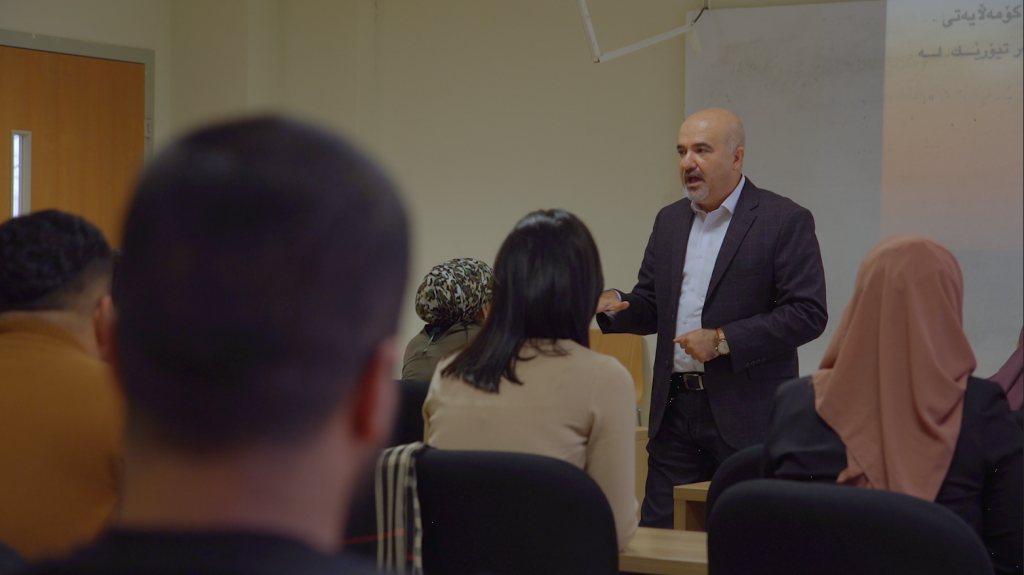
Our focus in the training of local colleagues: Strengthening and systematising locally contextualised and developed concepts and counselling practice
As part of the MHPSS priority area, a variety of training programmes are offered in the Kurdistan Region of Iraq and Iraq for local psychological and psychosocial professionals. Many of these measures are carried out by international trainers who have little knowledge of the local contexts, are aimed at professional, academically trained specialists and teach trauma concepts and therapeutic or counselling approaches developed in Western contexts. Such training courses often fail to meet the needs of local counsellors who deal with cases of complex violence on a daily basis and who themselves live in violent circumstances and/or are threatened and stigmatised because of their work. They also tend to overlook and overwrite locally developed concepts and practices for dealing with the consequences of violence.
For example, Anfal surviving women in the Germian region reject a psychological definition of their suffering and are involved in collective structures for a remembrance forum, which is intended to be a place of remembrance and a social centre for joint remembrance work and joint activities (link to the remembrance forum project). Another example is dealing with conflicts in the family context. Colleagues at the KHANZAD Women’s Centre and other state and civil society counselling projects for women in situations of violence have rich and varied expertise in women-centred family mediation (link to detailed description), which takes into account the centrality of the family in Kurdish society.
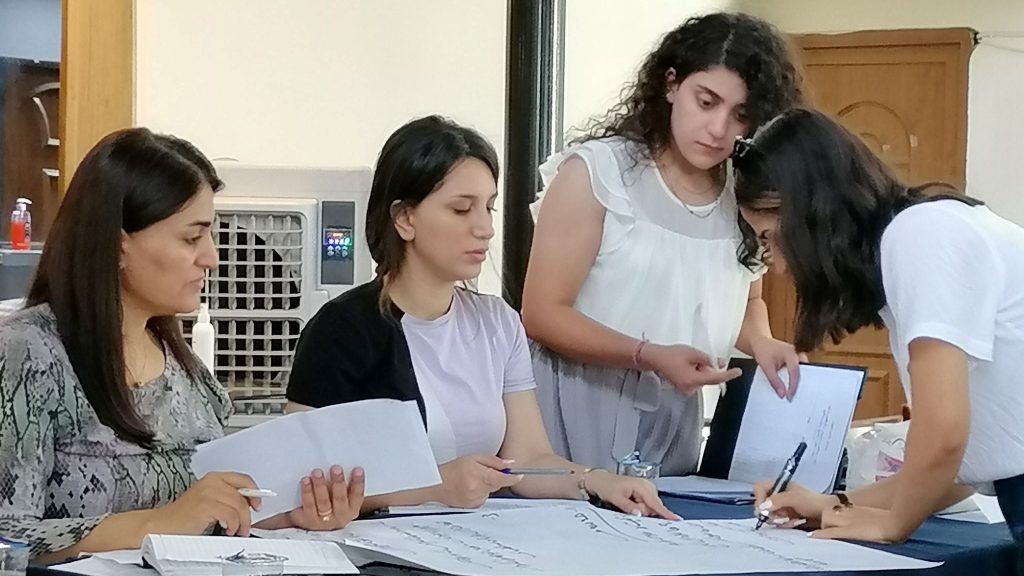
Qualification workshop at the KHANZAD Women’s Centre
Training courses for local professionals organised by HAUKARI e.V. and the KHANZAD Women’s Centre build on these contextualised approaches of local colleagues. Most of the training courses are organised with local trainers. In workshops and consultations with international trainers, the focus is also on contextualising international concepts of psychological and social work and strengthening and systematising local theoretical and practical approaches.
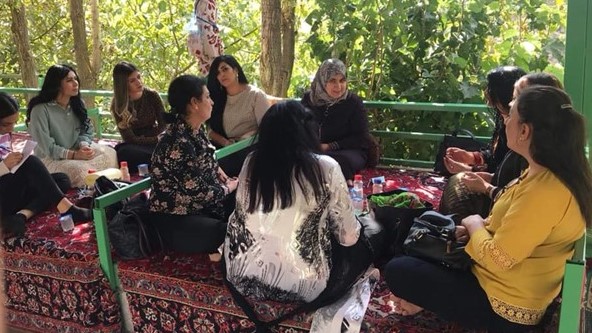
Group supervision KHANZAD employees
Supervision and Selfcare
The employees of KHANZAD and civil society and state partners all work under great pressure. They are confronted with complex situations of violence and clients at risk of murder and suicide on a daily basis. In addition, they themselves live in a context characterised by insecurity, violence and fear of the future and are exposed to threats, misunderstanding and stigmatisation in their environment as a result of their counselling work. Since 2016, all employees of civil society and state partner organisations working in the projects funded by HAUKARI e.V. have received regular group supervision from local experts in psychology and the social sciences. Supervision is understood as a space for reflection in which case supervision, team coaching, relaxation/self-assurance and individual counselling are all possible.
The supervisors share their experiences with each other and – occasionally – with German counsellors at regular specialist conferences and training courses.
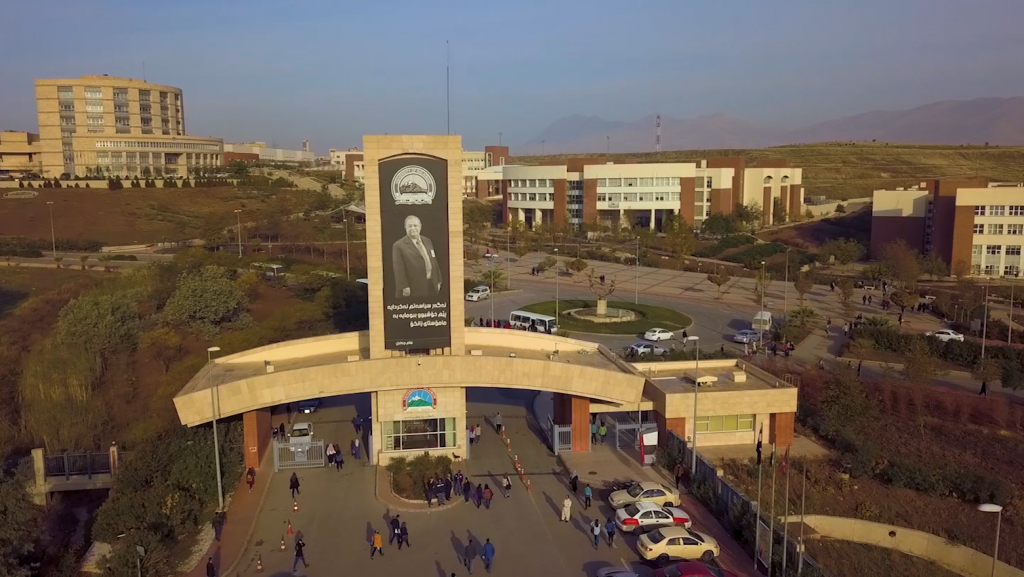
Universität Sulaimania, Kurdistan-Irak
Cooperation with local universities - Networking between theory and practice
HAUKARI e.V. and KHANZAD work closely with local universities in Sulaimania and Germian/Kalar. Professors and lecturers from both universities provide further training and supervision for project staff and take part in the planning and evaluation of HAUKARI and KHANZAD projects.
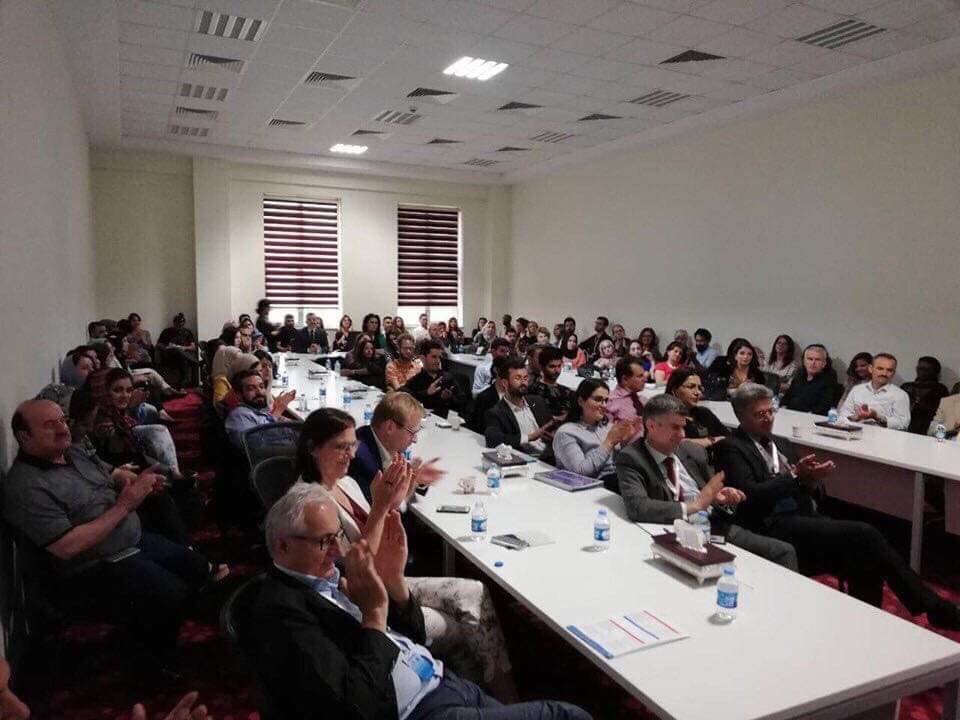
Conference “East meets West: Exchange and Interaction of Global and Local Psychosocial, Psychotherapy and Psychotraumatology Methods between Middle East and Western Countries“, Dohuk, Kurdistan-Iraq, June 2019
In June 2019, HAUKARI e.V. and KHANZAD organised a practice panel at the international conference ‘’East meets West: Exchange and Interaction of Global and Local Psychosocial, Psychotherapy and Psychotraumatology Methods between Middle East and Western Countries” at the Institute of Psychotraumatology at the University of Duhok, which was attended by academics and practitioners of psychosocial and trauma work from Kurdistan-Iraq, Iraq, Iran, Kenya, Europe and the USA with the support of the Gesellschaft für Internationale Zusammenarbeit (GIZ). In the practical panel, staff and supervisors from KHANZAD and the Kurdistan Regional Government’s Directorate for Combating Violence Against Women (DCVAW) discussed their work practice and the psychosocial counselling and supervision approaches developed from it with eighty international guests.
In October 2019, HAUKARI e.V. and KHANZAD participated as cooperation partners in the international conference on ‘Social Work in Post-War and Political Conflict Areas – Challenges and Chances’ at the University of Sulaimania. It was organised by the Department of Social Work at the University of Sulaimania and the Evangelische Hochschule für Soziale Arbeit Bochum and funded by the German Academic Exchange Service. The conference brought together researchers, teachers, students and practitioners of social work from various cities in the Kurdish region, Iraq, Lebanon, Egypt, Germany, Switzerland and South Africa to discuss the challenges of social work in war and conflict regions and to critically reflect on the West-East/North-South transfer of concepts and approaches in this field. The conference was documented on film: